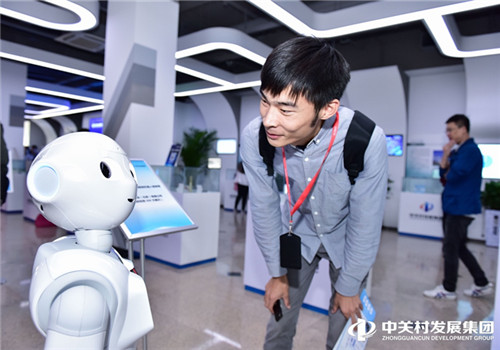Beijing has become a cradle of technological innovation and cultural development, according to VIPs during their tour of China's capital city from Aug 20 to 23.

A visitor communicates with a robot in Zhongguancun Exhibition Center. (Photo: China Daily)
Hailing from 13 countries involved in the Belt and Road Initiative, the participants of the event, named China Now: Silk Road Rediscovery Tour of Beijing upon the 70th Anniversary of the People's Republic of China, are key opinion leaders, journalists and photographers.
At Zhongguancun Exhibition Center, the first stop on the last day of the tour, an array of products in fields such as new information technology, biology and health, intelligent transport, new energy and new materials, were showcased to the guests.
The ONE smart piano, invested in by world-famous pianist Lang Lang and well-known entrepreneur Li Kaifu, attracted particular attention for its ingenuity. Utilizing the latest in smart learning technology, the piano has so far helped almost a quarter of a million people of all ages learn the piano in a new and exciting way.
The VIPs waited patiently, each wanting to have a try to see if they had what it takes to become a maestro pianist. Among them was Maung Maung oo, a Burmese writer. He said such smart learning tools and inventions can help to enrich people's lives across the globe.
Mugendi K. M'Rithaa, former president of the World Design Organization, said he could see how convenient life could become in the future after taking a closer look at a self-driving vehicle from Geely, backed by leading Chinese tech company Baidu.
The group then toured software technology provider iSoftS-tone and Zhongguancun Software Park, interacting with different applications of cloud computing, internet of things, big data and artificial intelligence.
Maung Maung oo said that Beijing has experienced rapid growth and Zhongguancun has been the spearhead of the city's science and technological innovation.
In addition, Beijing has been working hard to give its cultural industries a new lease of life.
At the 798 Art Zone, a landmark of Beijing's urban culture, Smiljana Vlajic, a cultural expert from Serbia, said, "All cities need to create such spaces for arts."
Another creative cluster, 751 D-Park, was once a gas factory, with the old complex and disused facilities now refurbished.
"Our factory is an example that showcases the capital's effort to make outdated industrial resources serve cultural development," said Zhang Junyuan, once the factory director and now the general manager in charge of the park.
"It now hosts big design and fashion weeks and many Chinese designers and musicians - for example, Zhang Yadong and Xiao Ke - are active here," Zhang added.
Yasir Habib Khan, a senior journalist for Geo TV in Pakistan said that the idea of transforming an old factory into a cultural zone is very impressive and innovative.
"In my country, there are many abandoned industrial zones. The Pakistani government is in urgent need of such solutions," he said.
Masum Gok, a journalist of the Modern Silk Road of the Red Cat Press in Turkey, said, "People should take Beijing as a starting point for understanding China."


